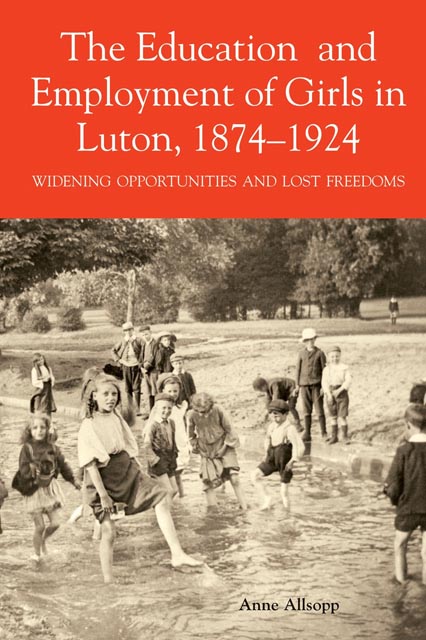Book contents
- Frontmatter
- Contents
- List of Illustrations
- List of Tables
- Dedication
- Acknowledgements
- Abbreviations
- Introduction
- Chapter One Luton: Scientiae et labori detur
- Chapter Two Further Perspectives Concerning Employment Patterns for Women
- Chapter Three Sunday Schools
- Chapter Four Education in the Time of the School Board
- Chapter Five Teaching: An Alternative Occupation
- Chapter Six Teacher Training and the Education of Students Aged Over Fourteen Under Bedfordshire County Council
- Chapter Seven Elementary Education 1903–1924
- Chapter Eight Rural Schools
- Chapter Nine Learning and Living
- Chapter Ten Secondary Education for Girls
- Conclusion
- Appendix
- Bibliography
- Index
Chapter Ten - Secondary Education for Girls
Published online by Cambridge University Press: 03 August 2023
- Frontmatter
- Contents
- List of Illustrations
- List of Tables
- Dedication
- Acknowledgements
- Abbreviations
- Introduction
- Chapter One Luton: Scientiae et labori detur
- Chapter Two Further Perspectives Concerning Employment Patterns for Women
- Chapter Three Sunday Schools
- Chapter Four Education in the Time of the School Board
- Chapter Five Teaching: An Alternative Occupation
- Chapter Six Teacher Training and the Education of Students Aged Over Fourteen Under Bedfordshire County Council
- Chapter Seven Elementary Education 1903–1924
- Chapter Eight Rural Schools
- Chapter Nine Learning and Living
- Chapter Ten Secondary Education for Girls
- Conclusion
- Appendix
- Bibliography
- Index
Summary
Higher education for girls
Historically the education of girls was considered to be of less importance than the education of boys for ‘women were identified with the private domain of the home’. This was believed to be a ‘natural division’; women were ‘relative rather than autonomous beings’ and were ‘inferior and subordinate to men’. From about 1845, there grew up a movement which fought for the provision of secondary and higher education for women, but no evidence has been found to suggest that this movement had any support in Luton where education for girls was seen to be unimportant. According to June Purvis one reason for the campaign to educate girls from the middle classes was the large number of ‘poorly educated middle-class women [who] had to earn their own living’. This was not significant to Luton in the context of the hat industry.
After 1874, girls in Luton received a basic elementary schooling, but middle-class parents did not see this as appropriate for their daughters. The education which they received has been considered more fully in Chapter Nine, but it is safe to say that most of them were either taught at home or attended private schools. Another route which could be taken by girls who wanted to improve their own education was the pupil-teacher system and this is addressed in Chapter Five. Crucial to this study is the establishment in 1904 of a recognized secondary school which began to take significant numbers of girls from the middle classes as well as capable girls who earned a free place. With the arrival of this school, opportunities for girls began to match those for boys although, in the early days at least, boys still seemed to have received more consideration.
When a separate secondary school for girls was opened in 1919, it was run on similar lines to the North London Collegiate School, the pioneering school run by Frances Mary Buss. She had introduced a wide curriculum and expected high standards from her girls, many of whom received a college education and became headmistresses themselves. In this way a network of similar schools grew up throughout the country.
- Type
- Chapter
- Information
- The Education and Employment of Girls in Luton, 1874-1924Widening Opportunities and Lost Freedoms, pp. 220 - 243Publisher: Boydell & BrewerFirst published in: 2023



